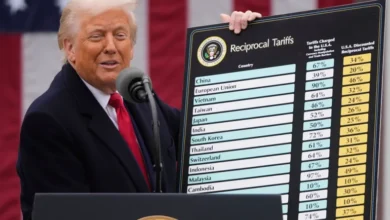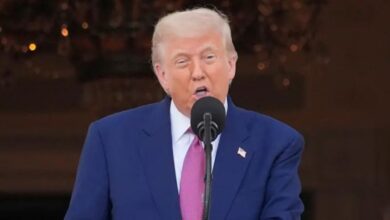Revitalizing American industry: A conversation with FCC Commissioner Nathan Simington

The United States is losing its grip on industrial and technological dominance, and China is filling the void. Years of naïve economic policies and misplaced faith in unregulated free markets have left the United States vulnerable.
In a candid discussion with Reconnaissance Research founder and CEO Abdulaziz Al-Anjeri, the United States Federal Communications Commission (FCC) Commissioner Nathan Simington delivers a blunt assessment of how China has overtaken the US in key sectors such as telecommunications, shipbuilding, and advanced manufacturing.
Simington, pulls no punches in his critique of America’s economic missteps and the urgent need for a national industrial strategy.
He lays out a stark warning: If the US fails to act decisively, it will fall further behind, with devastating consequences for both economic security and national defense.
In your article, you highlight ‘unforced errors’ and ‘economic distortions’ in US policy that contributed to China’s trade dominance. What specific policy missteps do you believe were most damaging?
“The most damaging policy misstep is really just the way we do accounting and corporate valuation in the United States. There is an incentive to get expensive assets off balance sheets in order to facilitate off-balance sheet financing and to create the appearance, if not the reality, of better returns relative to balance sheet size. Every public company in the United States is incentivized to play this shell game; unfortunately, China took the other side of that bet. China now holds the expensive, productive assets that American firms offloaded. And while that might not be a problem when any individual American firm does it, yet when they all do it we’ve created a systemic offshoring crisis, particularly in advanced manufacturing. This perhaps isn’t an issue at the level of, say, 1980s Mexican maquiladora-level product manufacturing and packaging—manually filling shampoo bottles with ladles, where cost of labor predominates. But when all of your advanced electronics, including all of their rare earth inputs, come from the same few square miles of China because American firms would rather rent than buy, you’ve just created a crisis of national security and economic resiliency because public markets are accustomed to over indexing against productive assets.
“I say ‘public company’ because the world’s richest man is an industrialist who manufactures in the United States but keeps most of his business interests privately held. Public-company finance exists as a way to invest the savings of the middle classes; to the extent that this proves an inadequate model, inherently or because of its long-standing regulatory complexion, the US must simply consider alternatives for the social functions that public companies presently serve.”
Your analysis critiques a ‘naïve free markets’ approach to trade. How do you reconcile the need for market freedom with the necessity of safeguarding national industrial interests?
“Markets are very good at a lot of things. Command socialism doesn’t work because it subverts three norms that markets require to operate: allocation of resources through market-based price discovery; incentives to invest; and property rights. These truly are engines of progress, innovation, and wealth without which we cannot do, and I do not intend to suggest otherwise. Having said that, naïve capitalism is the idea that free participation in an efficient, minimally-regulated but strongly-enforced market is the primary, or even sole, consideration with which a nation state should concern itself as it orders its economy. The ‘spherical cow’ in this assumption is the idea that security is a given, which is a luxury belief that most countries can’t afford; perhaps the United States can no longer afford it either. This thinking created our allergy to industrial policy, for instance. We no longer live in a unipolar world in which American capitalists enjoy the luxury of concerning ourselves exclusively with our own enterprises without regard to a larger social and security context.
Economic security is national security, but tautologies can also be read backwards—and that means that national security considerations can, and should, guide national thinking in economic development. And, frankly, we need to find a way to get our heads around, and even formally model, the cost overhang of systemic threats to national security that may arise. For instance, if we have built our national communications networks using cheap and easily-compromised electronics acquired for pennies from global rivals, we may have assumed costs to security and intellectual property outstripping any possible price savings.”
You write that China’s industrialisation was “a conscious, targeted choice.” What specific lessons can the U.S. realistically adopt from China’s playbook?
“China is the world leader in advanced manufacturing not because it has the best people or processes, but because it directed the entire heft of the state toward that specific purpose. When the United States acts with national purpose toward technological enterprise, we get the space program, Bell Labs, and the internet. What do we have like that now? We have a program here, a bill there, but the nearest approximation we have of national purpose is bipartisanship—and most bipartisan ‘achievements’ have nothing of national purpose within them, but instead are shambolic grab-bags of priorities for which it is difficult or impossible to tell which way the arrow of effort should point. And even when you can discern what the goal was, the program is constructed in such a way as to functionally preclude its accomplishment—problems are not solved, but merely perpetually ‘addressed.’ Perhaps, for some career politicians and civil servants, this is more congenial than it is for the public. At any rate: it’s time to pick a technological domain, any domain, and achieve serious-minded clarity around its execution. I, personally, would like to see us land a person on Mars. I’m certain China will if we don’t.
“Chinese leadership in this area, incidentally, imposes significant national security costs on the United States and on its friends and partners abroad. If Chinese products and industrial operations technologies are the market leaders and there are no Western alternatives, then every country must make the unpalatable choice between going 100 percent Chinese, or remaining a tech generation behind.
In 2023, I met with US Navy Secretary Carlos Del Toro at the National Press Club in Washington, DC. He highlighted that US naval shipyards cannot match the output of Chinese ones, noting that ‘they have 13 shipyards, and in some cases, one of their shipyards has more capacity than all of ours combined’.”
How urgent is the need to revitalize the US military-industrial base?
“Cost-plus pricing for United States prime military contractors is a great way to ensure that costs stay high even if margins stay fixed, which means that executives get their bonuses indexed for revenue growth, but no one is really held to account for profitability. That should change for many reasons, not least of which is that high margin businesses tend to invest more in R&D than other businesses. But tabling that for the moment: we have precious little state capacity in all kinds of heavy industries. Shipbuilding is a dire example. We have two icebreakers in the United States, one of which is sent to the southern hemisphere for six months of the year and then has to spend two in dry dock in Seattle because of the undue strain put on it from overuse. We are buying icebreakers that Sweden doesn’t use anymore because we can’t make one ourselves. We can’t lay undersea cable, either, because we can’t build the shipsfor that—China can. And does. When we think about security and resiliency, I don’t think we should be counting national security assets of any class by the 1s and 2s, nor should we be relying on rivals or adversaries to build things for us.”
In areas like telecommunications and electric vehicles, China has emerged as the undisputed global leader. Is it realistic for the US to regain dominance in these sectors, or should it focus on new frontiers?
“When it comes to electric vehicles or telecommunications, the United States has no choice. We must be dominant in these fields. There is no other option. This is a situation where, at least when it comes to global powers, second place is the first loser. And, to take an example with which I am familiar—telecommunications—this can have a lot to do with the way international bodies develop consensus on standards for commercial operation of telecommunications technology. When China does another greenfield installation of a Huawei 5G network in a developing Latin American country, it has bought a delegate at the International Telecommunication Union and put a big microphone in our hemisphere to boot. There’s very little to say: the situation is manifestly unacceptable.”
















